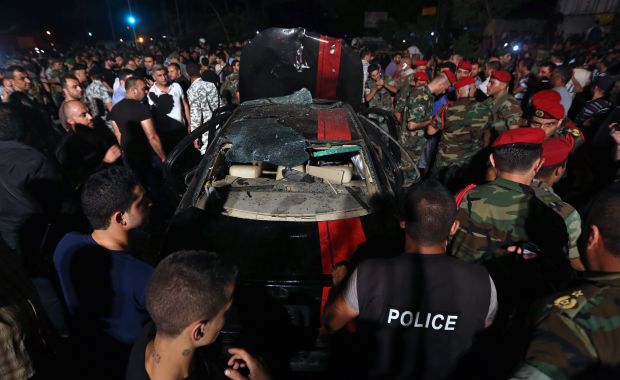
Lebanese army and citizens gather at the site of a car bombing in a southern suburb of Beirut, Lebanon, on Tuesday, June 24, 2014. (AP Photo/Bilal Hussein)
Beirut, Asharq Al-Awsat—Fears continue to spread in Lebanon about the presence of the Islamic State of Iraq and Syria (ISIS) after the Sunni militant group claimed responsibility for Wednesday’s attack on a central Beirut hotel, the third such attack in two weeks.
The militant group has expanded its operations in both Syria and Iraq, giving rise to fears that it could also seek to start an insurgency against the Lebanese government at a time when the country still has no president.
In a statement published on Friday, ISIS announced that a Saudi suicide bomber had attacked the Duroy Hotel in central Beirut. Three police officers were wounded in the attack.
“Two lions of ISIS, who infiltrated the city of Beirut at the Duroy Hotel, engaged a group from the General Security service loyal to the Party of Satan,” the statement said, referring to Shi’ite militia Hezbollah.
The statement said that ISIS would continue its attacks on Hezbollah, adding “that this is the first rain, and we tell you that there are hundreds of people seeking suicide who love the blood of rejectionists,” a derogatory term used by radical Sunnis to describe Shi’ites.
The Iran-backed Shi’ite militia has been heavily criticized for its involvement in the Syrian crisis and backing for the Bashar Al-Assad regime, amid fears that Sunni Islamists could seek to target Hezbollah at home for its role in Syria.
The Syrian crisis has divided the Lebanese people, with Shi’ites and Maronite Christians mostly supporting Assad and Sunnis sympathizing with the rebels.
Speaking to Asharq Al-Awsat, a senior member of the Islamist Hizb Al-Tahrir (Liberation Party), Sheikh Mohamed Ibrahim, acknowledged that many Lebanese Sunnis “sympathize” with ISIS. He blamed the radicalization of Lebanese Sunni youth on “the Lebanese government and its wrongful practices, most importantly the random arrests it carried out in Tripoli.”
Lebanon’s second city has become increasingly divided along sectarian lines since the outbreak of the Syrian conflict, with the majority Sunni community backing rebels across the border, to the anger of the Alawite and Shi’ite minorities.
“I do not deny that some of the youth are reacting [to Hezbollah] in a wrong manner, but the talk in the street of Lebanon’s authorities being subjugated to Hezbollah strengthens [public] support for extremist organizations,” Ibrahim added.
The fears of Sunni radicalization come as Islamists residing in the Ain Al-Hilweh Palestinian refugee camp in Sidon raised a banner on Saturday praising ISIS, according to local media.
“O God, grant victory to our brothers, the mujaheddin in the Islamic State of Iraq and Syria and Lebanon,” the banner read.
Retaliatory attacks by Sunni Islamist groups on Hezbollah-dominated areas have increased greatly since 2012, including an attack on the headquarters of the Iranian embassy in Beirut in November 2013.
Fears over a renewal of attacks targeting Shi’ites have prompted the cancellation of this year’s public Iftar, or fast-breaking, dinners hosted by Hezbollah during the Muslim holy month of Ramadan.
“There is no reason to panic, but at the same time we must be cautious, particularly as terrorists may target places outside their repertoire of targets in the Hezbollah-dominated areas,” a source close to Hezbollah speaking to Asharq Al-Awsat on the condition of anonymity said.
The source did not rule out the possibility of “targeting Sunni-majority areas with the aim of provoking tensions,” adding that “[Public] Iftar dinners may be a target of terrorism.”
Lebanese political expert Talal Atrissi attributed ISIS’s crossing the borders into Lebanon to “the gains it has made in Iraq, after taking over Mosul and advancing towards other areas, and to its failure to topple the [Assad] regime and establish an Islamic caliphate in Syria.”
Atrissi told Asharq Al-Awsat that the deteriorating security in Iraq “has encouraged [ISIS] to spread” to the rest of the region. But he maintained that the group’s influence in Lebanon will be different from that in Iraq and Syria and “will remain limited within the framework of directing strikes against Hezbollah and the Lebanese military.”
Nazeer Rida and Paula Astih reported from Beirut.
